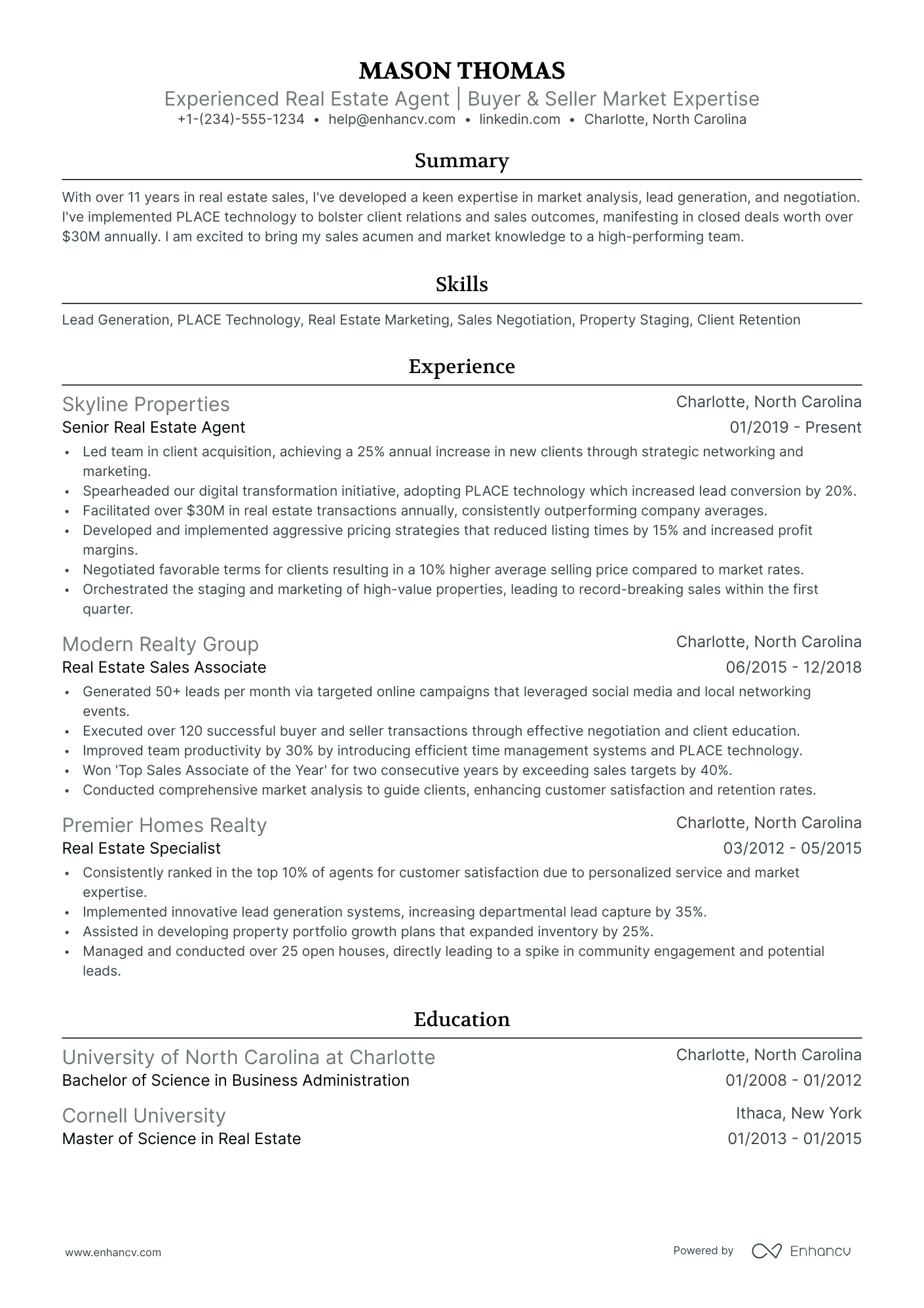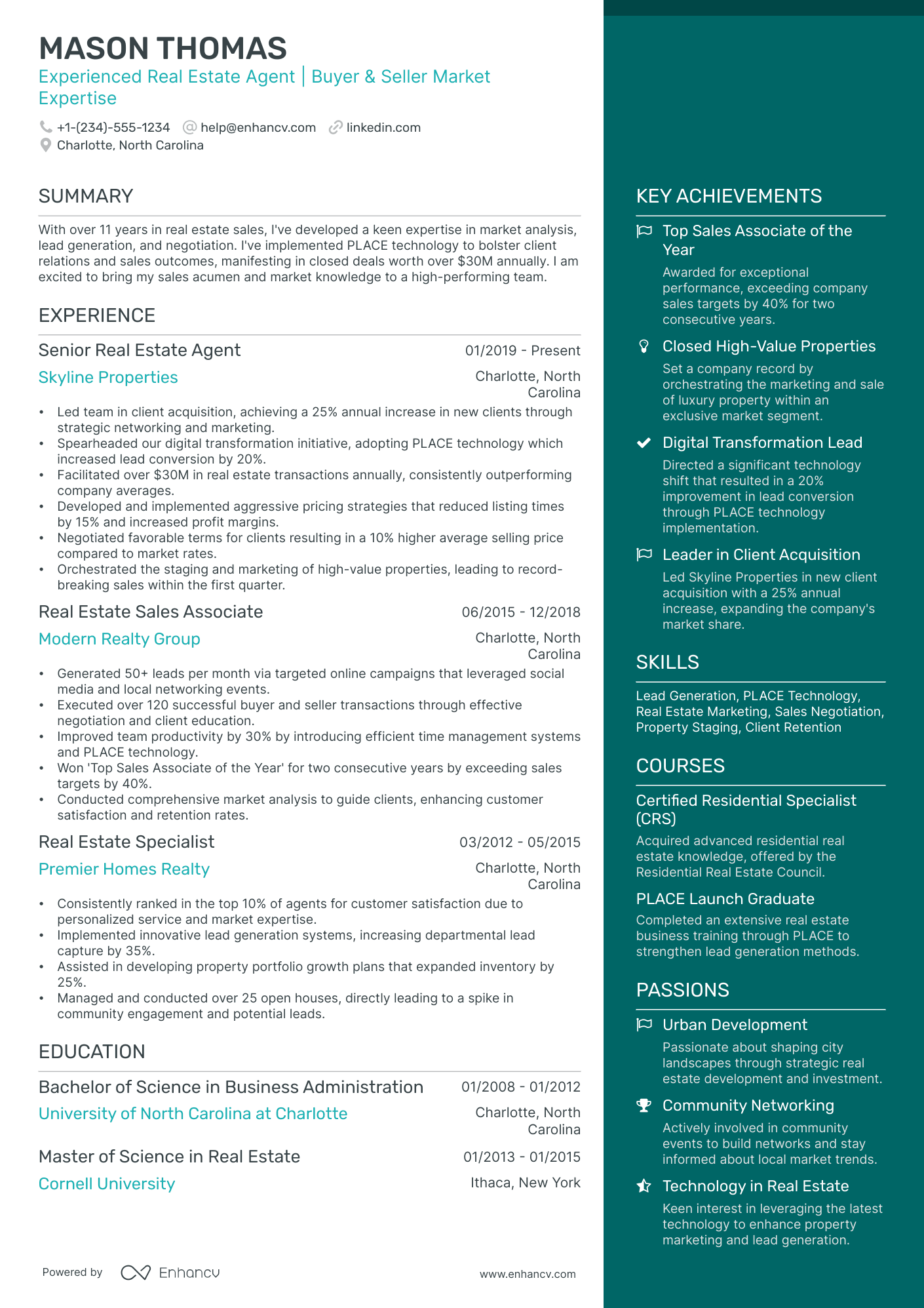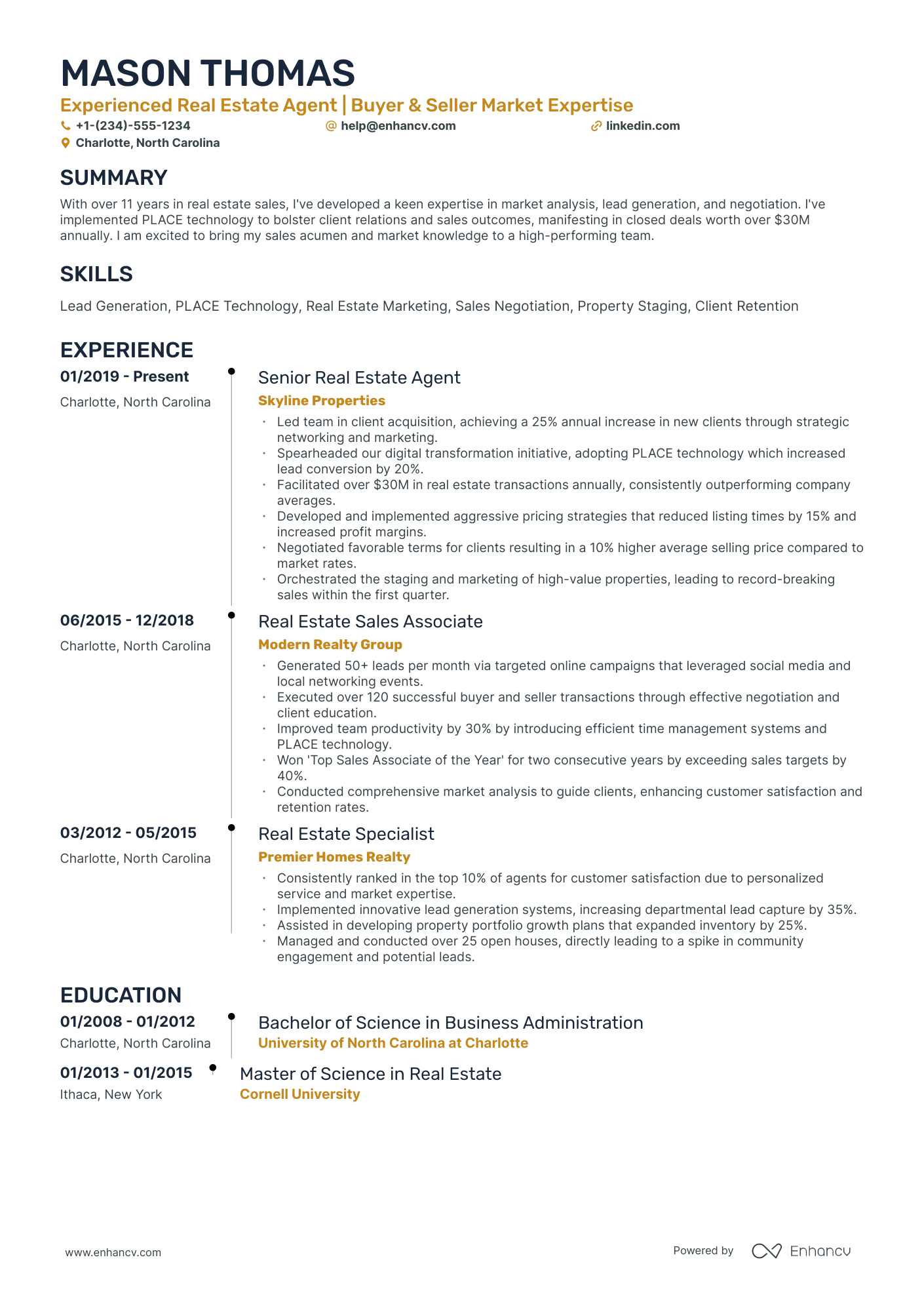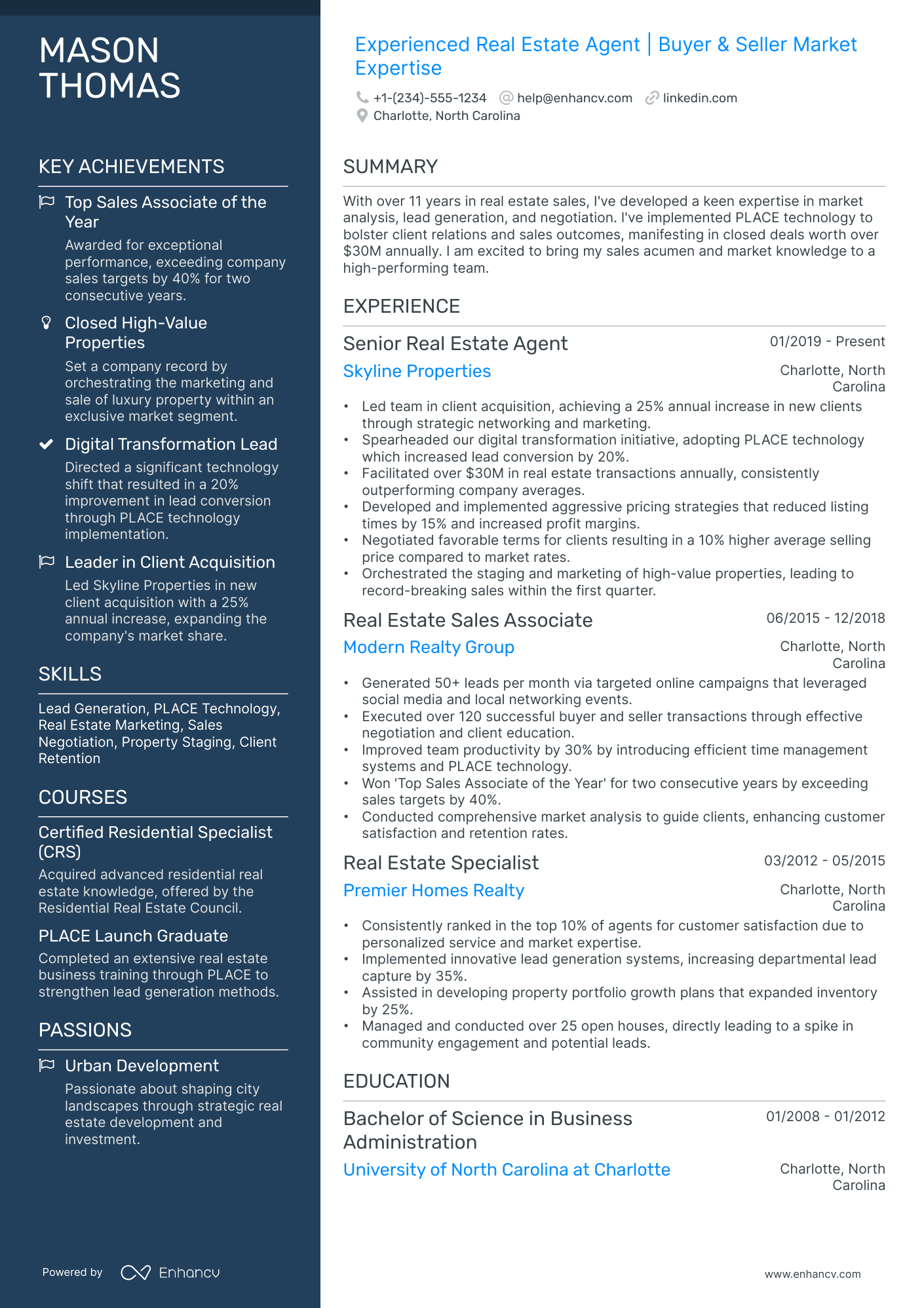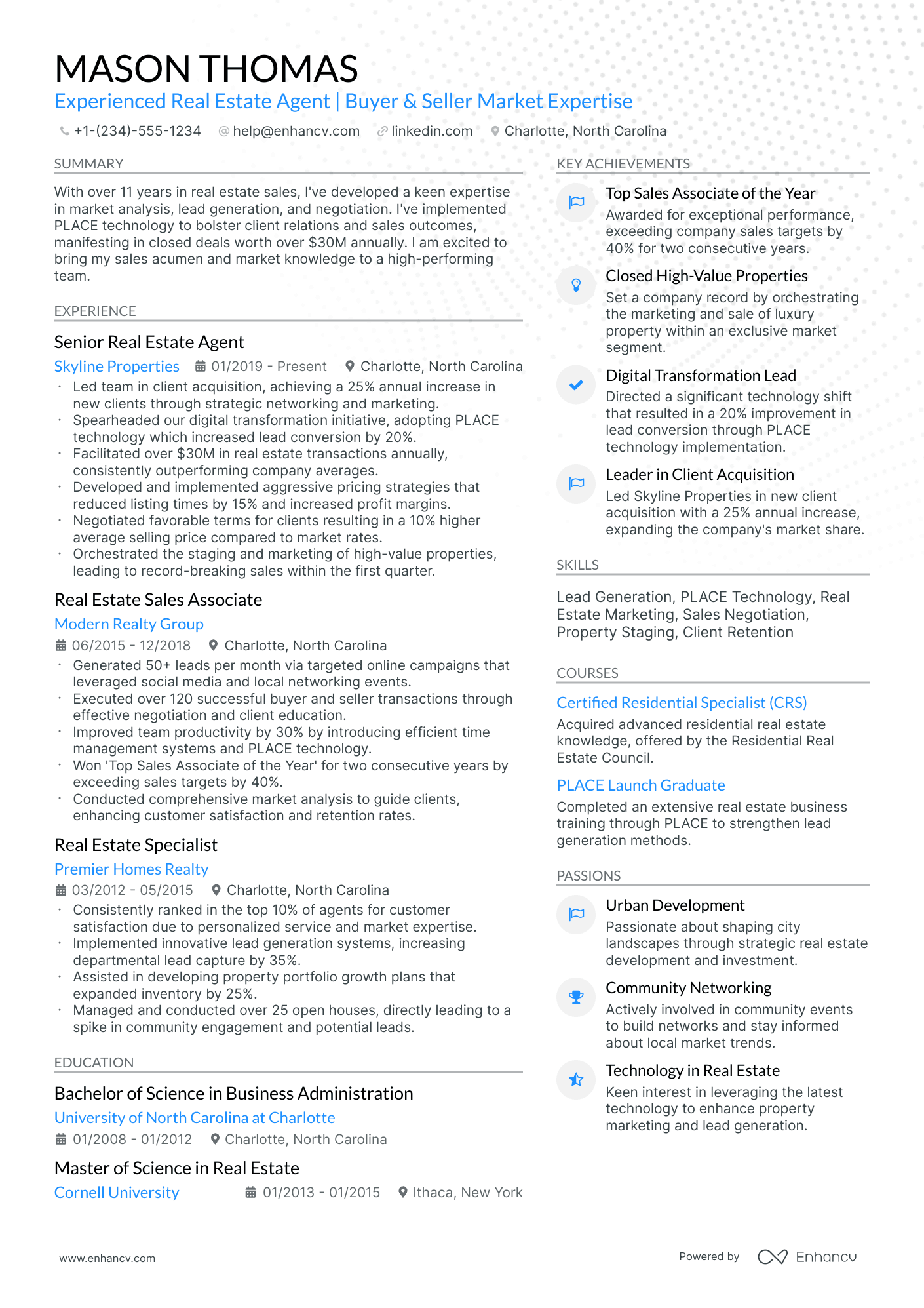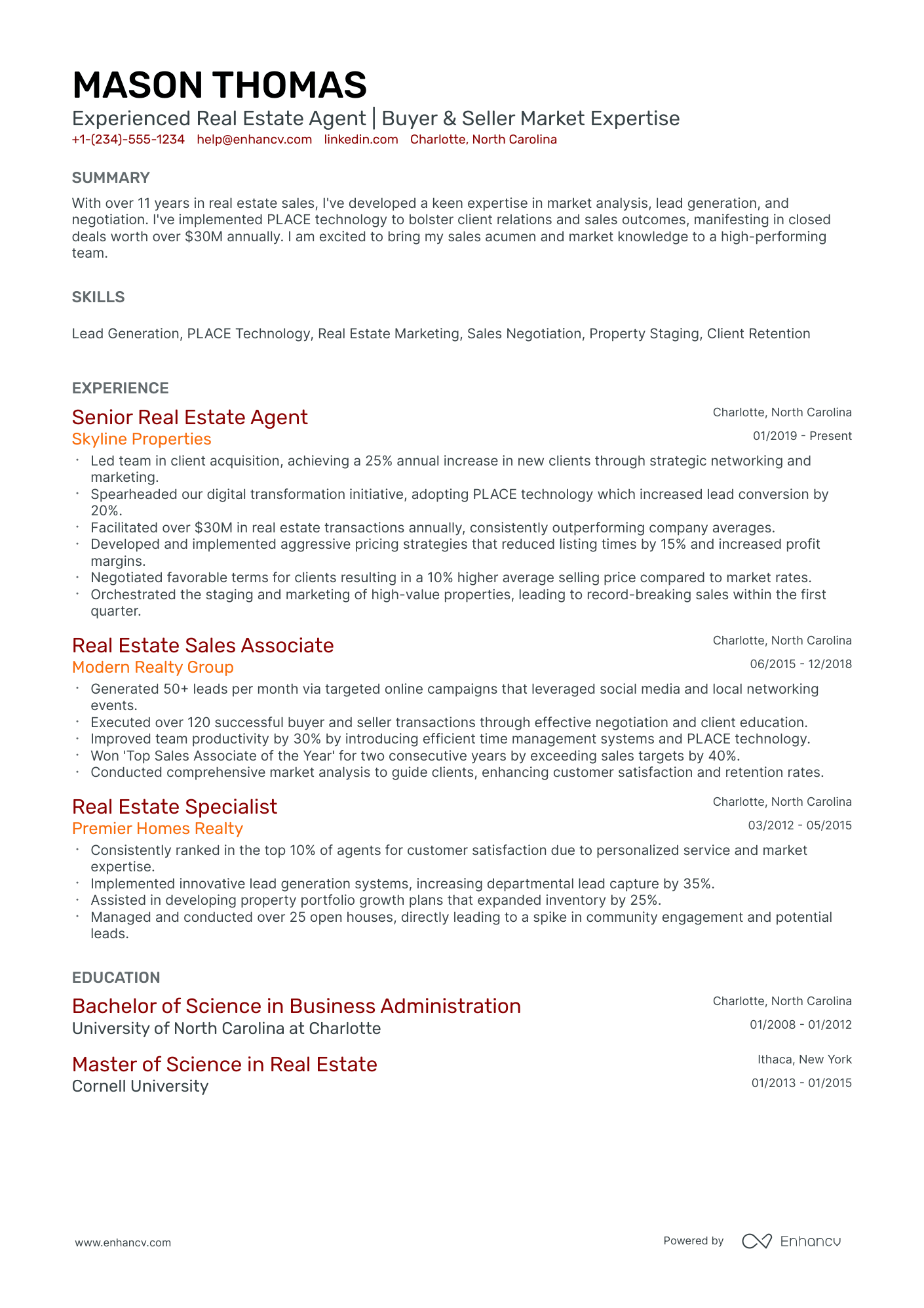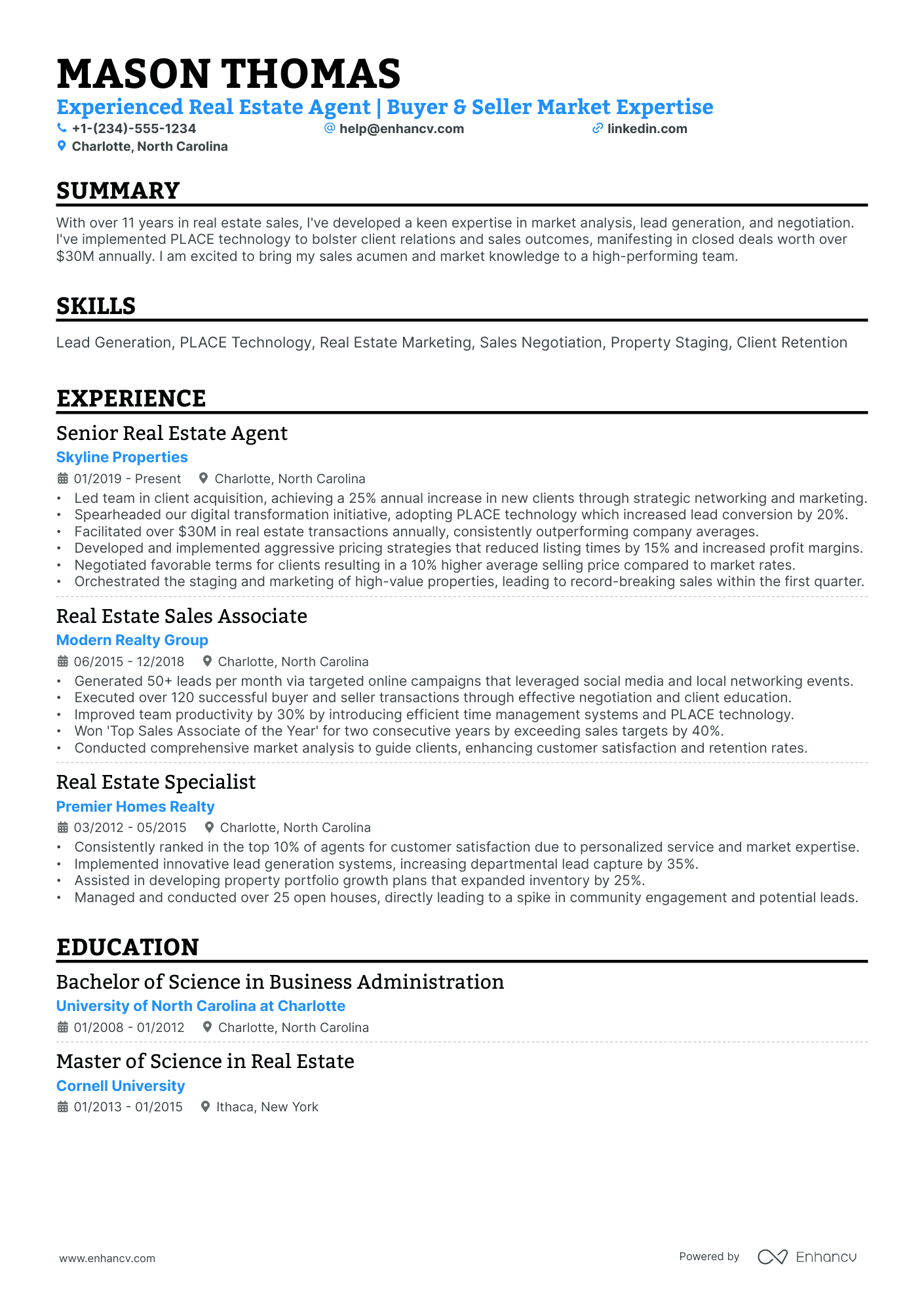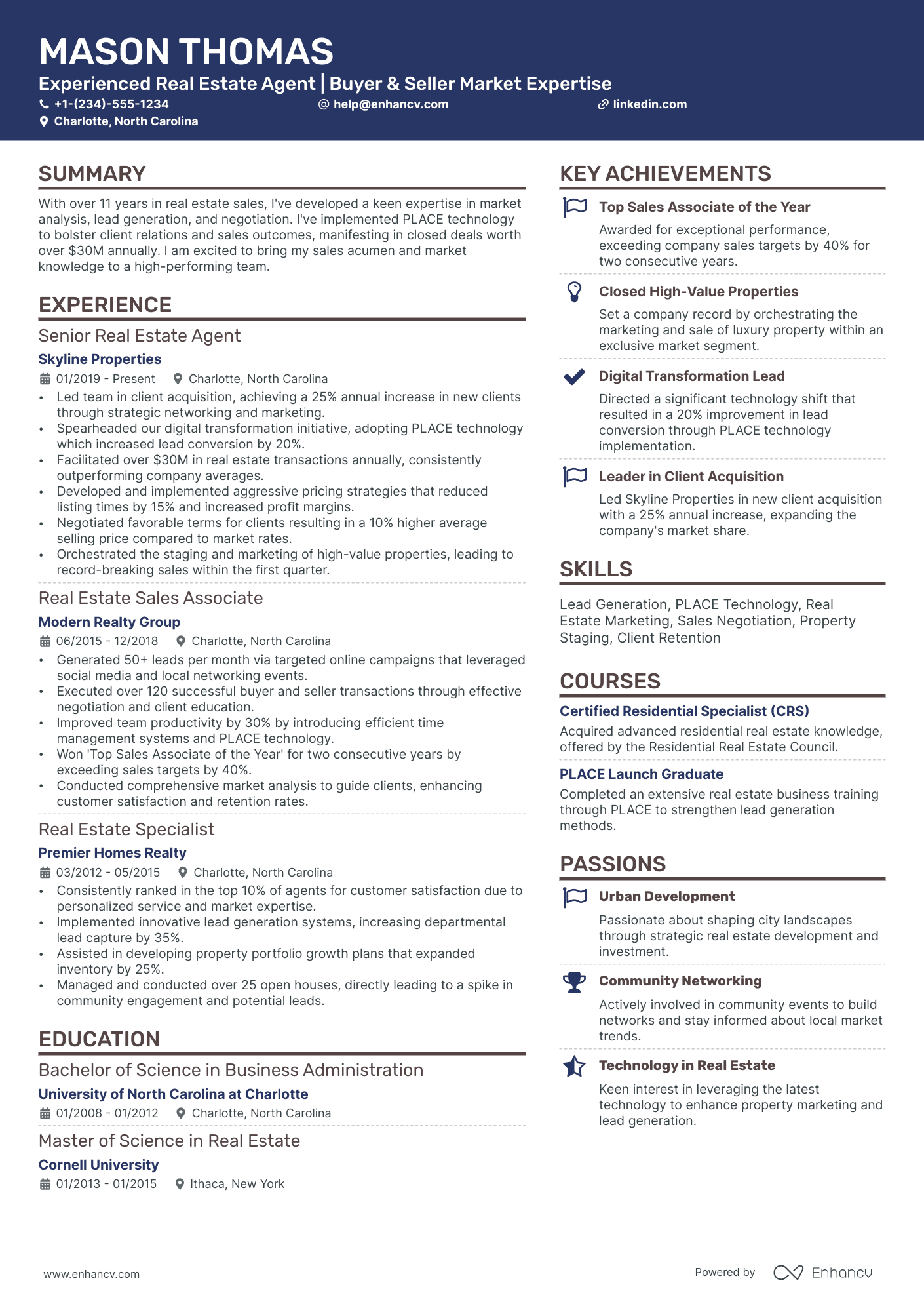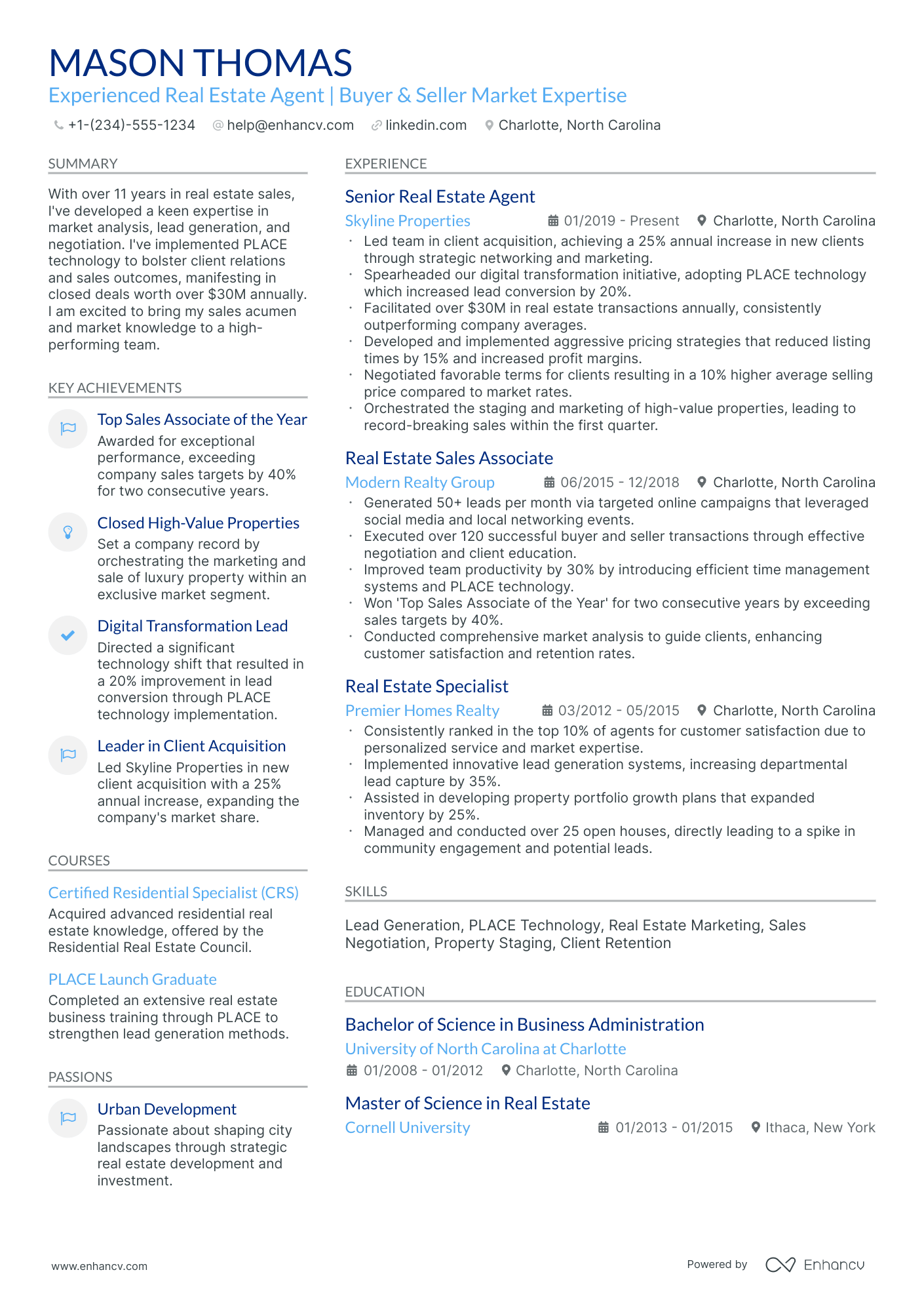As a real estate developer, one significant challenge you may encounter is articulating the complexity and scope of your project management skills on a resume in a clear and concise manner. Our guide can assist you by providing structured strategies and examples on how to effectively highlight your project accomplishments and management expertise to capture the attention of potential employers.
- Which sections do you need to include in your resume to meet recruiters' requirements;
- How to write your real estate developer resume experience section - even if you have don't have little to no work experience;
- Real-life professional examples to guide you how to write the most important real estate developer resume sections;
- Adding even more sections so your real estate developer resume stands out with professionalism and your personality.
We've also selected some of the best (and most relevant) resume guides for the real estate developer role you're applying for:
- Real Estate Assistant Resume Example
- Real Estate Professional Resume Example
- Broker Resume Example
- Real Estate Sales Manager Resume Example
- Real Estate Manager Resume Example
- Facility Manager Resume Example
- Realtor Resume Example
- Assistant Property Manager Resume Example
- Real Estate Salesperson Resume Example
- Real Estate Intern Resume Example
Best practices for the look and feel of your real estate developer resume
Before you even start writing your real estate developer resume, first you need to consider its layout and format.
What's important to keep in mind is:
- The reverse-chronological resume is the most widely used format to present your experience, starting with your latest job.
- Your real estate developer resume header needs to include your correct, professional contact details. If you happen to have a professional portfolio or an updated LinkedIn profile, include a link to it.
- Ensure your resume is no longer than two pages - you don't have to include irelevant experience on your resume just to make it look longer.
- Unless specified otherwise, submit your resume in the most popular format, the PDF one, as this will ensure your real estate developer resume isn't altered.
Think about the market’s preferences – a Canadian resume, for instance, could have a different layout.
Upload & Check Your Resume
Drop your resume here or choose a file. PDF & DOCX only. Max 2MB file size.
PRO TIP
Bold the names of educational institutions and certifying bodies for emphasis.
The key to your real estate developer job-winning resume - present your expertise with these sections:
- A header to make your resume more scannable
- Snapshot of who you are as a professional with your resume soft skills, achievements, and summary or objective
- Job advert keywords in the skills section of your resume
- Resume experience quantifying your past job successes with metrics
- A relevant education, certification, and technical sills section to provide background to your technological/software capabilities
What recruiters want to see on your resume:
- Proven track record of successful project management, including budgeting, scheduling, and delivery of real estate development projects.
- Demonstrated ability to secure financing and manage financial aspects of development projects, including cost control and investment analysis.
- Understanding of zoning laws, regulatory compliance, and experience navigating the permitting and approval process for different types of real estate projects.
- Strong network of industry contacts, including investors, construction firms, architects, and municipal agencies, to support business and project objectives.
- Portfolio showcasing completed projects, reflecting an ability to manage the full lifecycle of development from concept to completion, including land acquisition, design, construction, and sales or leasing.
Writing your real estate developer resume experience
Within the body of your real estate developer resume is perhaps one of the most important sections - the resume experience one. Here are five quick tips on how to curate your real estate developer professional experience:
- Include your expertise that aligns to the job requirements;
- Always ensure that you qualify your achievements by including a skill, what you did, and the results your responsibility led to;
- When writing each experience bullet, ensure you're using active language;
- If you can include a personal skill you've grown, thanks to your experience, this would help you stand out;
- Be specific about your professional experience - it's not enough that you can "communicate", but rather what's your communication track record?
Wondering how other professionals in the industry are presenting their job-winning real estate developer resumes? Check out how these real estate developer professionals put some of our best practices into action:
- Headed the development of a luxury 250-unit condominium project, securing financing and city approvals while leading a team of architects and engineers.
- Implemented innovative sustainable building practices to reduce energy consumption by 15%, enhancing project marketability and long-term value.
- Negotiated complex land acquisition deals and zoning changes, resulting in a 20% increase in the company's real estate portfolio.
- Spearheaded the turnaround of a previously stalled mixed-use development project, driving completion 3 months ahead of schedule.
- Cultivated relationships with local government and community leaders to foster support for new developments, increasing brand recognition within the region.
- Orchestrated the pre-sales of residential units, achieving 80% capacity sold prior to the end of construction phase.
- Led a cross-functional team in the master planning and development of a 500-acre new urbanist community, incorporating smart city technology.
- Managed a budget of $150 million, ensuring all project milestones were met within financial constraints and reporting to stakeholders on progress.
- Liaised with marketing teams to develop a successful branding strategy, which contributed to a 35% increase in project visibility and community engagement.
- Directed due diligence for potential development sites, identifying and mitigating risks, leading to a reduction in project start-up times by 25%.
- Executed a successful build-to-suit program for key commercial clients, resulting in 100% tenant occupancy upon building completion.
- Enhanced internal workflows and processes through the adoption of real estate development software, increasing team efficiency by 40%.
- Championed the development and construction of three high-rise office buildings, contributing significantly to the expansion of the city's business district.
- Integrated cost-saving methods which decreased project expenses by 10%, allowing for additional amenities and better finishes within the same budget.
- Facilitated a joint venture partnership with an international investor, resulting in a 50% capital boost for upcoming large-scale mixed-use projects.
- Coordinated the land development process for suburban housing projects, from site selection to construction, selling over 300 homes in the first year.
- Pioneered the use of modular construction techniques to shorten build times by 30% while maintaining high standards of quality and safety compliance.
- Secured competitive financing solutions and grants for affordable housing projects, directly impacting the local community by providing 200 new homes.
- Managed the redevelopment of a historic downtown block, preserving cultural heritage while integrating modern commercial and residential spaces.
- Conducted comprehensive market analyses to guide development strategies, which led to attracting high-profile tenants and a subsequent rental rate increase of 12%.
- Oversaw the implementation of a phased construction approach that ensured business continuity for existing retail tenants during the redevelopment.
- Initiated the conversion of underutilized properties into profitable mixed-use developments, adding value to the urban landscape and increasing ROI by 15%.
- Developed comprehensive risk management protocols which significantly reduced project delays due to unforeseen events or regulatory hurdles.
- Implemented cutting-edge building automation systems that attracted tech-savvy tenants and commanded premium rental rates.
- Masterminded the design and development of a gated residential community with eco-friendly features that resulted in a National Green Building Standard certification.
- Executed strategic land purchases and negotiated favorable terms, significantly expanding the company’s land bank and supporting future growth.
- Bolstered investor and client confidence by leading regular progress tours and maintaining transparent communication about project timelines and benchmarks.
- Steered the strategic conception and market launch of a prop-tech tool for effective land analysis, which played a pivotal role in site acquisition decisions.
- Collaborated with architects to design an innovative mixed-use development, receiving an award for outstanding design from the Urban Land Institute.
- Navigated complex regulatory environments to secure entitlements for multifaceted real estate projects, ensuring compliance and avoiding costly delays.
Quantifying impact on your resume
- Include the total value of real estate projects you have successfully developed to demonstrate your experience with large-scale investments.
- List the percentage of projects completed on time and within budget to showcase your efficiency and project management skills.
- Specify the number of units developed in residential projects to provide a sense of the scope you're comfortable working with.
- Indicate the average return on investment (ROI) for your projects to highlight your financial acumen and success in generating profit.
- Mention the total square footage of commercial property you have developed to reflect your capability in handling extensive developments.
- Quantify the amount of time and cost savings achieved through strategic planning and efficient execution on your projects.
- Report the growth in occupancy or lease-up rates for your developments to illustrate your effectiveness in marketing and sales.
- Describe the number of sustainable or eco-friendly projects completed, emphasizing your commitment to environmentally responsible developments.
Action verbs for your real estate developer resume
What if you don't have any experience?
There are two very common scenarios about candidates with less experience. They are either:
- Fresh out of college in search of a real estate developer role
- Transferring over from a completely different field
Both of these types of candidates still have a shot at landing their first job in the industry.
All they need to do about the experience section of their real estate developer resume is:
- Consider their strengths - would the outcomes of their previous roles or niche skill sets impress recruiters? Feature those towards the top of your resume
- Exclude any and all irrelevant experience items - remember that at the end of the day, you're telling a story that aims to align with the ideal candidate for the real estate developer job
- Win recruiters over with personality - perhaps your ambition, dreams, and diligence would make you the perfect fit for the real estate developer role. Dedicate resume space to detail your personality traits by showcasing how they've helped you succeed in past roles
- Tailor your experience to specific job requirements - ensure your real estate developer resume answers the advert in the best way possible.
Recommended reads:
PRO TIP
If you failed to obtain one of the certificates, as listed in the requirements, but decide to include it on your resume, make sure to include a note somewhere that you have the "relevant training, but are planning to re-take the exams". Support this statement with the actual date you're planning to be re-examined. Always be honest on your resume.
Shining a light on your real estate developer hard skills and soft skills
To win recruiters over, you must really have a breadth of skill set presented and supported within your real estate developer resume.
On hiring managers' checklists, you'd initially discover hard or technical skills. Those are the technology (and software) that help you perform on the job. Hard skills are easy to quantify via your education, certificates, and on-the-job success.
Another main criterion recruiters are always assessing your real estate developer resume on is soft skills. That is your ability to communicate, adapt, and grow in new environments. Soft skills are a bit harder to measure, as they are gained both thanks to your personal and professional experience.
Showcase you have the ideal skill set for the role by:
- Dedicating both a skills box (for your technical capabilities) and an achievements or strengths section (to detail your personal skills).
- When listing your skills, be specific about your hard skills (name the precise technology you're able to use) and soft skills (aim to always demonstrate what the outcomes were).
- Avoid listing overused cliches in the skills section (e.g. Microsoft Office and Communication), unless they're otherwise specified as prominent for the role.
- Select up to ten skills which should be defined via various sections in your resume skills sidebar (e.g. a technical skills box, industry expertise box with sliders, strengths section with bullets).
Spice up your resume with leading technical and people skills, that'd help you get noticed by recruiters.
Top skills for your real estate developer resume:
AutoCAD
Revit
GIS Software
Project Management Software
Building Information Modeling (BIM)
Real Estate Financial Modeling
Site Development Tools
Construction Management Software
Cost Estimation Software
Zoning and Land Use Regulations
Negotiation
Leadership
Communication
Problem Solving
Time Management
Critical Thinking
Team Collaboration
Adaptability
Networking
Decision Making
PRO TIP
If you failed to obtain one of the certificates, as listed in the requirements, but decide to include it on your resume, make sure to include a note somewhere that you have the "relevant training, but are planning to re-take the exams". Support this statement with the actual date you're planning to be re-examined. Always be honest on your resume.
The importance of your certifications and education on your real estate developer resume
Pay attention to the resume education section . It can offer clues about your skills and experiences that align with the job.
- List only tertiary education details, including the institution and dates.
- Mention your expected graduation date if you're currently studying.
- Exclude degrees unrelated to the job or field.
- Describe your education if it allows you to highlight your achievements further.
Your professional qualifications: certificates and education play a crucial role in your real estate developer application. They showcase your dedication to gaining the best expertise and know-how in the field. Include any diplomas and certificates that are:
- Listed within the job requirements or could make your application stand out
- Niche to your industry and require plenty of effort to obtain
- Helping you prepare for professional growth with forward-facing know-how
- Relevant to the real estate developer job - make sure to include the name of the certificate, institution you've obtained it at, and dates
Both your certificates and education section need to add further value to your application. That's why we've dedicated this next list just for you - check out some of the most popular real estate developer certificates to include on your resume:
The top 5 certifications for your real estate developer resume:
- Chartered Surveyor (MRICS) - Royal Institution of Chartered Surveyors
- Certified Commercial Investment Member (CCIM) - CCIM Institute
- Certified Property Manager (CPM) - Institute of Real Estate Management
- Master in Real Estate Development (MRED) - Various Universities
- Leadership in Energy and Environmental Design Accredited Professional (LEED AP) - U.S. Green Building Council
PRO TIP
If you happen to have plenty of certificates, select the ones that are most applicable and sought-after across the industry. Organize them by relevance to the role you're applying for.
Recommended reads:
Adding a summary or objective to your real estate developer resume
One of the most crucial elements of your professional presentation is your resume's top one-third. This most often includes:
- Either a resume summary - your career highlights at a glance. Select the summary if you have plenty of relevant experience (and achievements), you'd like recruiters to remember about your application.
- Or, a resume objective - to showcase your determination for growth. The perfect choice for candidates with less experience, who are looking to grow their career in the field.
If you want to go above and beyond with your real estate developer resume summary or resume objective, make sure to answer precisely why recruiters need to hire you. What is the additional value you'd provide to the company or organization? Now here are examples from real-life real estate developer professionals, whose resumes have helped them land their dream jobs:
Resume summaries for a real estate developer job
- Seasoned real estate developer with over 15 years of comprehensive experience in overseeing multimillion-dollar residential and commercial projects. Brings a track record of successfully navigating complex rezoning issues and has a keen eye for design that maximizes both aesthetic appeal and ROI. Secured $300 million in funding for a transformative mixed-use project in downtown Chicago.
- Dynamic professional with a decade’s expertise in urban planning and real estate development. Proven skills in project management and strategic planning resulted in the on-time, under-budget delivery of a landmark 50-story high-rise. Leverages a Master’s in Real Estate Development and an architecture background to ensure projects meet both design and functionality standards.
- Highly motivated finance professional with 7 years’ experience pivoting into real estate development. Combines a sharp analytical mind with a CPA designation to expertly manage budgets and secure financing. Instrumental in raising $150 million for a green housing project that set new benchmarks in sustainable construction.
- Dedicated civil engineer transitioning to real estate development, fortified by a strong foundation in infrastructure and project management from a 9-year tenure at a leading engineering firm. Exemplary project coordination skills and a Master’s in Civil Engineering feed into an exceptional ability to optimize site potential and project viability for large-scale development projects.
- Eager to apply a fresh perspective to real estate development with an innovative approach to project management and design. Committed to upholding sustainable building practices while advancing in a stimulating and fast-paced sector. Objective: leverage transferable skills from a 5-year career in high-tech project management to deliver competitive and environmentally conscious real estate solutions.
- Aspiring real estate developer with a recent MBA specializing in Real Estate and Urban Land Economics. Possesses robust analytical skills and a strong desire to design and execute development projects that revitalize communities. Objective: to apply rigorous business training and an insatiable hunger for urban innovation to create impactful and profitable real estate ventures.
Optimize your resume summary and objective for ATS
Drop your resume here or choose a file.
PDF & DOCX only. Max 2MB file size.
More sections to ensure your real estate developer resume stands out
If you're looking for additional ways to ensure your real estate developer application gets noticed, then invest in supplementing your resume with extra sections, like:
These supplementary resume sections show your technical aptitude (with particular technologies and software) and your people skills (gained even outside of work).
Key takeaways
- All aspects of your resume should be selected to support your bid for being the perfect candidate for the role;
- Be intentional about listing your skill set to be balanced with both technical and people capabilities, while aligning with the job;
- Include any experience items that are relevant to the role and ensure you feature the outcomes of your responsibilities;
- Use the summary or objective as a screenshot of your best experience highlights;
- Curate various resume sections to showcase personal, transferable skills.
